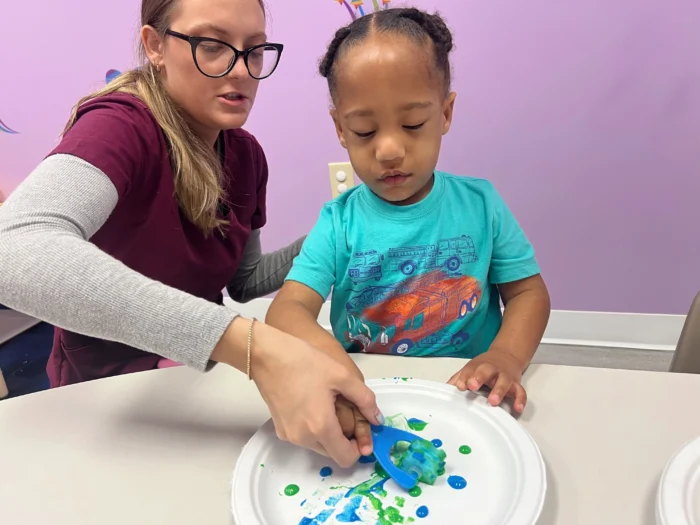
Characterized by a range of symptoms, autism presents unique challenges in the lives of affected individuals and their families. One of the first challenges for the parents of a child on the spectrum is accepting the diagnosis, and it often brings up the question what could have caused the ASD.
In this article, we’ll aim to uncover the mysteries surrounding the causes of autism, exploring genetic, environmental, and neurological factors. With a mix of scientific knowledge and careful questioning, we will attempt to answer not just the “what” but also the “why” behind autism.
What Is Autism?
To understand the causes, let’s first define the outcome.
Autism, also known as Autism Spectrum Disorder (ASD), is a complex neurological disorder that remains a topic of profound interest and extensive research in the medical community.
The term autism refers to a range of conditions characterized by:
- Challenges with social skills
- Repetitive behaviors
- Verbal and non-verbal communication
- Restricted interests
- Sensory sensitivity
According to the World Health Organization’s (WHO) data, it is estimated that one in 100 children has autism, which is why it is important to understand and address the diverse needs of individuals with autism.
Many parents struggle with their autistic child’s diagnosis due to the misconceptions and stigma surrounding the ASD. It’s essential to recognize that autism is not a disease but a developmental disorder. People with autism perceive and interact with the world differently, which can lead to challenges in traditional learning and social environments.
However, many autistic individuals demonstrate unique problem-solving abilities and a high attention to detail, which can help them navigate life in their own way. They may also exhibit profound creativity, expressing themselves through art, which enhances their motor and cognitive skills.
While there is no cure for autism, autism treatment methods are tailored to individual needs and can include various approaches. These treatments can offer support to both parents and their children, helping them manage the symptoms of autism and lead fulfilling lives.
What Are the Causes of Autism?
While the exact causes are still not fully understood, current evidence points to a combination of genetic and environmental factors. In this section, we will explore various aspects contributing to the development of autism, addressing some of the common questions and theories in this field.
Genetic Causes of Autism
- Research indicates that there is a significant genetic component in autism, as different studies have identified several genes associated with the disorder. This means that if you’ve had autism in the family, it increases the chances of having an autistic child.
- Some cases of autism are linked to specific genetic conditions, such as Fragile X syndrome or Rett syndrome.
- Additionally, researchers are trying to determine what chromosome causes autism, paying particular attention to anomalies in Chromosome 15.
Environmental Causes of Autism
- Environmental factors during prenatal development are also considered influential. In order to discover what causes autism during pregnancy, experts are examining the effects of maternal nutrition, stress, bacterial and viral infections, autoimmunity, and the impact of certain medications taken during pregnancy.
Neurological Factors
- Understanding what causes autism in the brain involves exploring the neurological comorbidities that not only accompany ASD but also contribute to its clinical severity. Some studies have emphasized three prevalent neurological comorbidities:
- Epilepsy
- Sleep disorders
- Motor impairment
Understanding these causes is crucial not only for developing effective treatments but also for supporting individuals with ASD and their families in managing the condition effectively.
Controversial Theories
Claims such as the one that Tylenol causes autism have sparked a number of debates. While there’s evidence hinting that using acetaminophen (Tylenol) during pregnancy might be associated with neurobehavioral issues in children, a clear cause-and-effect relationship hasn’t been confirmed. The lawsuit against Tylenol’s manufacturer, Johnson & Johnson, is lacking scientific evidence.
Studies indicate that the risk could increase with higher doses and more frequent use of the drug, emphasizing the need for further investigation to fully understand any potential links.
The vaccine-autism theory has also been a significant source of controversy. Despite extensive research and numerous studies, no credible evidence has been found to support a link between vaccines and autism. Leading health organizations, including the Centers for Disease Control and Prevention (CDC) and the World Health Organization, have consistently found vaccines to be safe and crucial in preventing serious diseases.
The persistence of the anti-vax movement, despite the lack of scientific evidence, highlights the challenges of addressing misinformation and the importance of relying on proven scientific facts for public health policies.
Autism Treatments
Autism treatments and interventions are highly individualized, focusing on each person’s unique challenges and accompanying medical conditions. Here, we explore some of the most recognized and widely used treatments for autism:
Behavioral Interventions
- Applied Behavior Analysis (ABA) is a prominent therapy targeting social interaction, communication skills, and academic performance, while also aiming to minimize behaviors that could be harmful.
- The Early Start Denver Model (ESDM), designed for children 12 to 48 months old, blends the strategies of ABA with fun, interactive play. This approach helps build speaking, socializing, and learning abilities in a natural, engaging way.
Educational Approaches
- Programs like the Treatment and Education of Autistic and Related Communication-Handicapped Children (TEACCH) use visual elements and structured environments to enhance learning and adaptability in individuals with ASD.
Social-Relational Approaches
- Techniques such as Floortime and Relationship Development Intervention (RDI) focus on developing social skills and emotional connections, often involving parents and peer mentors.
Occupational and Physical Therapies
- These therapies aim to improve everyday skills and physical coordination. Occupational therapy might also include sensory integration therapy to help with sensory sensitivities.
Psychological Approaches
- Cognitive-Behavior Therapy (CBT) is used for addressing co-occurring mental health issues like anxiety or depression, focusing on the interplay between thoughts, feelings, and behaviors.
Medication
- While there is no cure for the core symptoms of ASD, certain medications can manage co-occurring symptoms like anxiety, ADHD, or sleep disturbances.
Complementary and Alternative Treatments
- Some families opt for non-traditional treatments like special diets, herbal supplements, or mindfulness practices. However, these should always be discussed with healthcare providers.
The effectiveness of these treatments can vary, which is why it’s essential for families to work closely with healthcare providers to develop treatment plans that best suit their child’s needs.
Conclusion
Science is still learning about the exact causes of autism spectrum disorder, and at the moment, they are defined as genetic, environmental, biological, or combined. As research moves forward, we’re gaining new insights all the time not only about the causes, but the ASD treatment as well. Understanding the complexity of the conditions helps us approach autism with more depth and sensitivity, improving how we care for and support those affected by it.
FAQs
What are the main causes of autism?
It is believed that the main autism causes are a combination of genetic, biological, and environmental factors.
Are you born with autism or is it caused?
Autism is a condition people are born with, determined by a combination of genetic and environmental factors.
It’s important to understand that autism is not a mental illness and is not caused by any post-birth events. Although autism may become more apparent later in life, especially in cases of high-functioning autism or Asperger’s syndrome, this delayed recognition is due to the wide spectrum of symptoms and their severity.
Why is autism so common now?
The increased number of autism diagnoses is attributed to better awareness, broader diagnostic criteria, and improved screening methods. In other words, it’s not necessarily due to an actual increase in the number of cases but rather due to better detection and understanding of the spectrum.
What is the life expectancy of a child with autism?
The life expectancy of a child with autism can vary significantly, as highlighted by various studies. For example, from 39 to over 70 years, according to two major scientific studies.
In a study conducted over 20 years and published by the National Library of Medicine in 2019, research on mortality rates in individuals with ASD found that the average life expectancy is approximately 39 years.
However, some newer studies have shown higher numbers. A study led by UCL and published in 2023, which analyzed data from around 24,000 autistic individuals in the UK, sheds some light on this subject. This research found that while the life expectancy for those with autism can indeed exceed 70 years, this largely applies to individuals with less severe intellectual disabilities.
Still, it’s crucial to consider the study’s limitations, as noted by the authors themselves. They acknowledge that their research only covered a portion of the autistic population — specifically, those who have been formally diagnosed. This group may represent individuals with more significant support needs and co-occurring health conditions than the average among autistic people.



